Skyros Blog
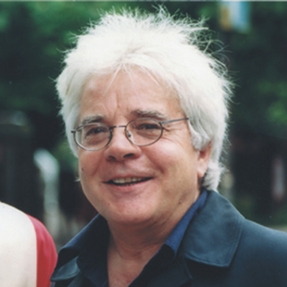
Yannis Andricopoulos, co-founder of Skyros Holidays, Europe's leading learning holiday (www.skyros.com), talks here about the 'peerless culture' of Skyros. This extract is from his book History, Politics and Dreams, which has been hailed as 'an erudite and elegant narrative, at times irreverent and provocative and at times romantic and lyrical'.
Actor, author, playwright and theatre director, Steven Berkoff described the book as 'Homeric, if that’s not too poncey a description'.
The Peerless Culture of Skyros
As many as twenty thousand people have joined Skyros over the years, many of them numerous times, and relished its unbridled spirit of adventure, creativity and joy. Many explored new possibilities, tried new things and unearthed amazing layers of themselves they did not even suspect existed.
In a world far removed from daily salaried routines, others took the opportunity to reassess their life, redefine their needs and re-set their priorities. 'The unexamined life', as Socrates said, 'is not worth living'.
Yet, the walk into the garden of our existence to reconnect with life’s fragrance lost in the alienated world we inhabit is not something most people would go for. Burdened by the lumpy, enervating mundane, sunk into the dailiness of life or trapped, as one woman wrote in Skyros, in ‘the treadmill of 50 to 60-hour working weeks in a back-stabbing academic environment’, most do not even think about what they really need in life.
And this what they do on a Skyros holiday . . .
Not that Skyros tells anyone what to do. But it does encourage people to get in touch with their gut feeling, question and challenge our culture’s assumptions and dauntlessly do what they need to do to lead a more fulfilling life.
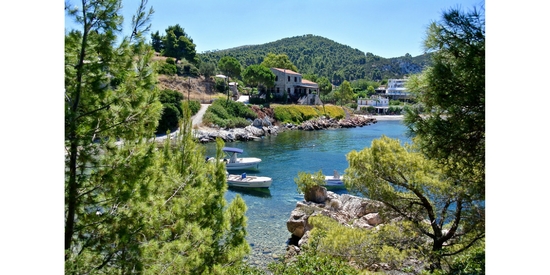
The process is underpinned by an ethos that emphasises being rather than having, doing rather than consuming and belonging rather than withdrawing into the garden of your private world. Rather than resign, accept and conform, people are encouraged to question, challenge and create.
Fulfilling our potential affirms what is best in ourselves. It also asserts man’s power over his creations – the market, machines, technology, systems, fashion, ideologies or fundamentalist beliefs.
This philosophical underpinning of the Skyros culture is developed and fine-tuned through an experiential practice that makes it work. As a result, people often return home with modified, and sometimes radicalised perceptions of both themselves and the world we live in.
Life as it is lived is no longer viewed as destiny
And this is what brings together the personal and the political, which are the two sides of the same coin. This is also what challenges the structures of our materialistic, consumerist and technocratic culture.
The context in which all this takes place is the community, the strongly beating heart of Skyros. It is the equivalent of the society we all live in at home, run, however, with different values:
- trust, honesty,
- openness and
- mutual support.
The principles the community rests on include cooperation rather than competition, participation rather than non-engagement, responsibility rather than indifference, respect for individuality rather than conformity and support for the individual’s drive to unearth his or her dormant potential.
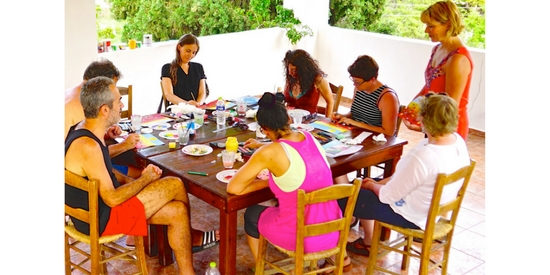
All this represents a different culture, very important in a wider context, for culture is central to the development of new, human-friendly social and political structures.
In a way, this is the working class culture re-visited – a culture, as expressed in Chartism, based on mutual aid and cooperation – and a friendly expression on its face. Opposed to it stand both the middle-class culture based on rewards for individual success and the aristocratic ideal of hierarchy grounded in birth and privilege.
People in the Skyros community are first and foremost asked to be themselves. This is the key to an authentic life lost in the intricate, confusing social network of interconnecting pathways that often seem to require the placing of genuine feelings in the safe and the display of their imitations.
– ‘Which of us’, Elisabeth in a JM Coetzee story, asks rhetorically, ‘is what he seems to be?’
To be themselves, people would have to cast aside habitual roles as a married partner, parent, boss, employee, official, client, club or union member or socialite, leave behind all features that make up their identity and reconnect with their essence.
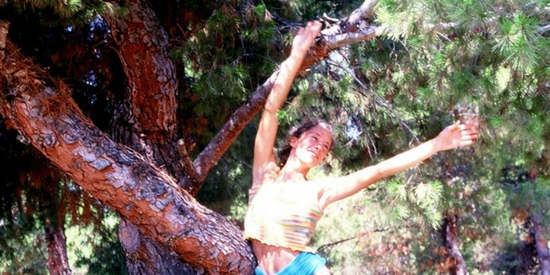
In other words, own themselves because, if they do not, others will do it for them. And this is not easy.
– ‘To be nobody but yourself in a world which is trying day and night to make you everybody else’, E. E. Cummings, the American poet and playwright, once said, ‘is the hardest battle you will ever fight’.
When I am in Skyros, I ask people to leave behind the trappings of the ‘real’ world, a world where, as Rachel says in a Virginia Woolf story, ‘nobody ever said a thing they meant, or even talked of a feeling they felt’.
– ‘Do not sail under false colours’, I emphasise, ‘and do not pretend to be what you’re not, for in this place it will not take you anywhere. Take a risk and show, instead, your real self in the certainty that you will be liked for what you really are. After all, we all have sides that we do not feel comfortable with and we are often uncharitable towards our own selves. Go for a full-blooded life, open up to the world and the world will also open up to you.’
Honesty demands, of course, courage
Overcoming my own fears of being overwhelming, I also ask them to give generously to others as much as they can without expectations of getting something in return.
– ‘Give lovingly for the pleasure of giving in terms of concern, time and attention, being also, incidentally, sure that having given your best, the best will come back to you’.
As Democritus said, he who loves no one is loved by no one.
‘But be also able to accept what is offered to you with appreciation and grace, for, sometimes, accepting is more difficult than giving.’
Be also a doer rather than a spectator and give an outlet to your creativity
–‘Try things you fancy, things you have never tried before, from singing to abseiling, from comedy improvisation to painting, from windsurfing to writing, even if you do not feel comfortable or confident about it – everybody’s on the same boat. Play and be silly if the mood takes you there.'
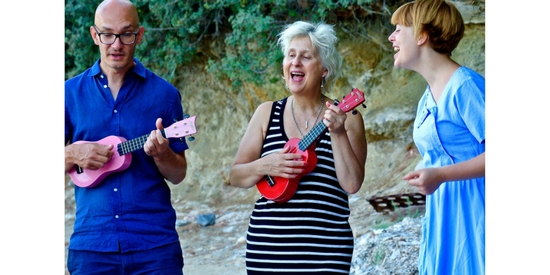
Having consulted my memory’s notes, I lastly advise them to reconnect with the child within, ‘the soul I had of old, when I was a child’, as Lorca would say, and the child’s curiosity, innocence, spontaneity, lack of fear and uncritical joy.
– ‘See everything as a world waiting to be discovered, a game to be enjoyed, an opportunity for a good laugh. Focus, like a child, only on the present and experience the child’s happiness at the simplest of things. Whatever your age, playing is the salt of life.'
– ‘And do not worry about anything or, as the Skyrians say, do not worry about at least two things in life: those that can be fixed and those that cannot.’
As it happens, in this honest and supporting environment, people who, if they had gone somewhere else, would have made certain that they had travelled as far as possible away from themselves, do listen and, as a rule, end up as happy as swallows in the spring.
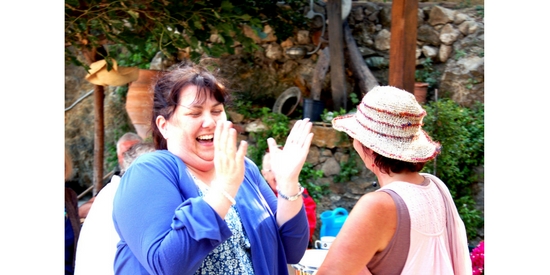
Find out more Skyros holidays and the wide range of courses, activities and rich community life here: www.skyros.com.
Yannis' book 'History, Politics and Dreams' can be purchased online through Amazon or through the Skyros office at office@skyros.com.

Now it's your turn. Are you intrigued by the way in which Skyros builds community life that encourages freedom of expression and creativity? If you've been on a Skyros holiday, has your experience had any effect on your own local community that you can share with us here? Tell us about your own experience of Skyros' peerless culture...Share your thoughts and feedback in the space below. We'll be looking out for you and looking forward to seeing your comments and continuing the conversation here. |










Comments
Thank-you for such lovely comments. It is so lovely to see that our Skyros Holidays have had such a wonderful and profound impact on your life. We love to receive comments like this, it really does make our day. xx
Thank-you for your comment. We too agree that our Atsitsa staff are fantastic. Without them where would we be? I'm sure they will love to see such glowing comments. xx